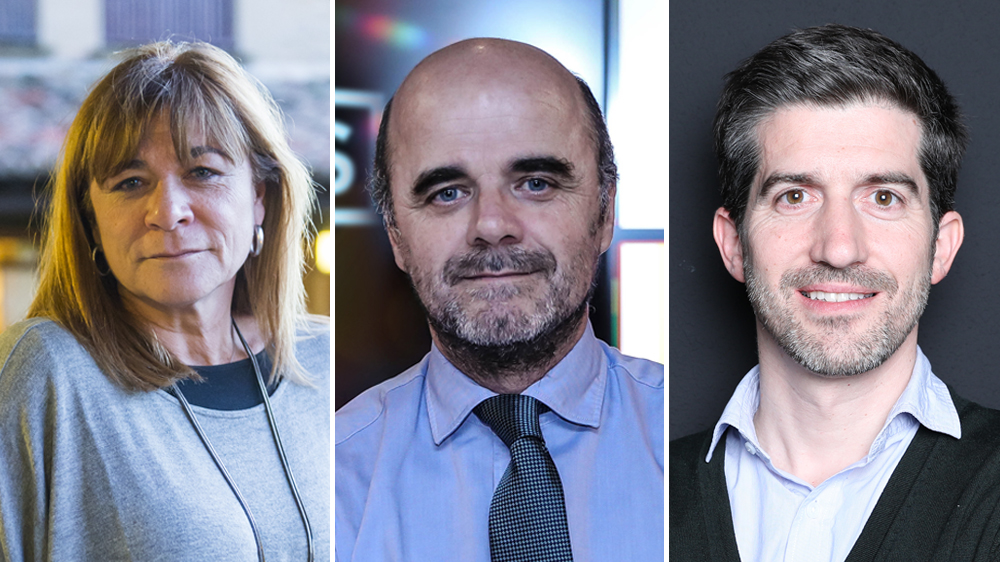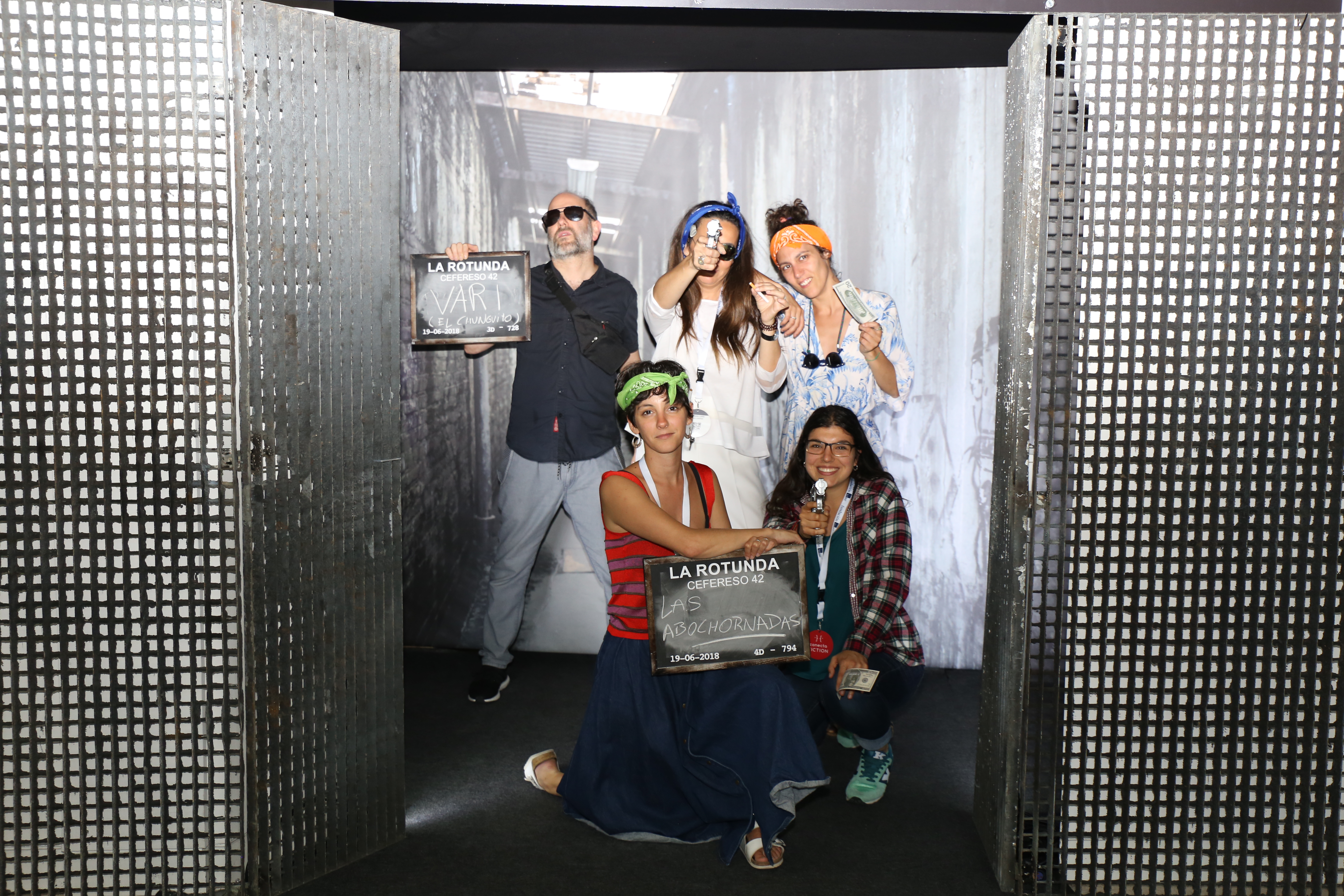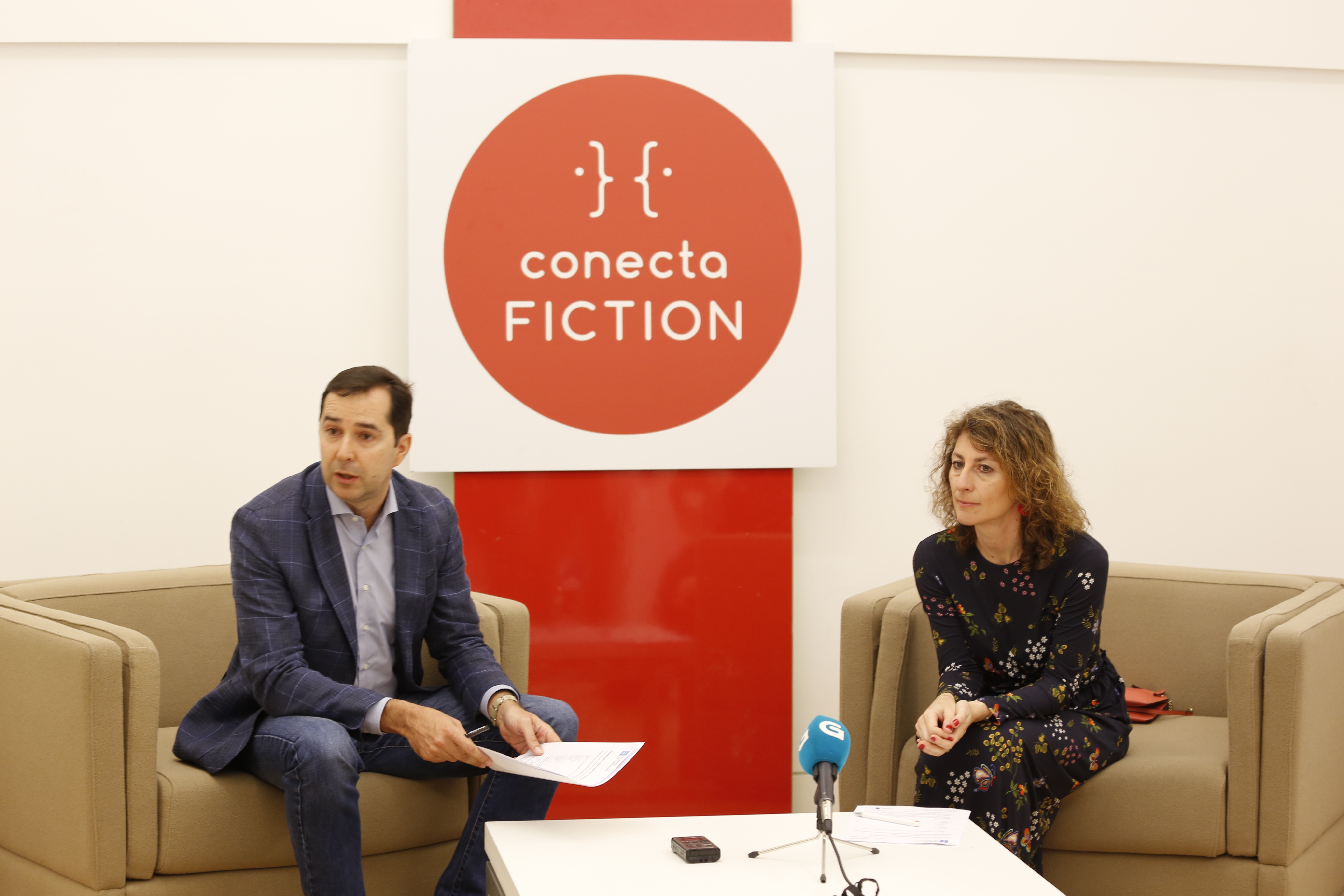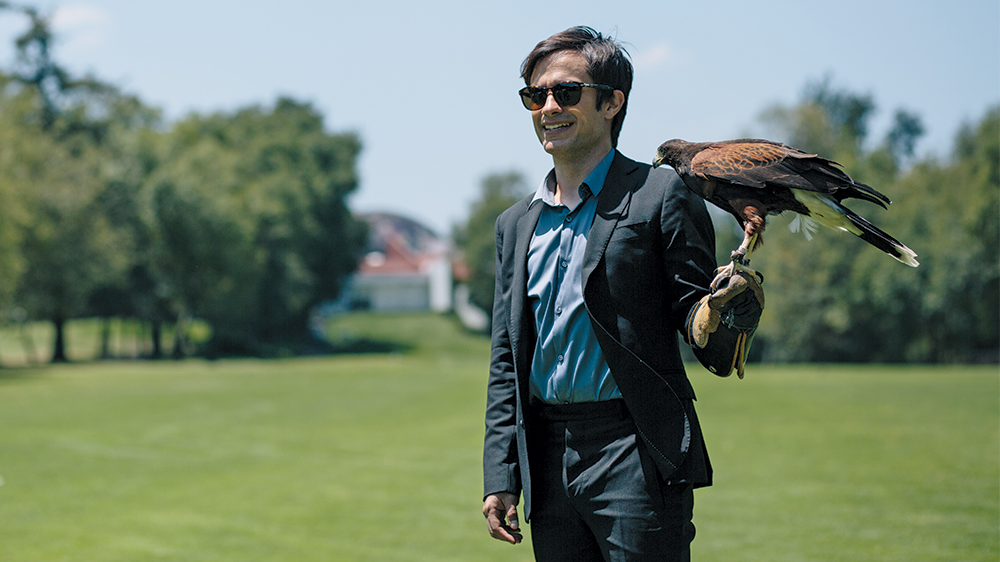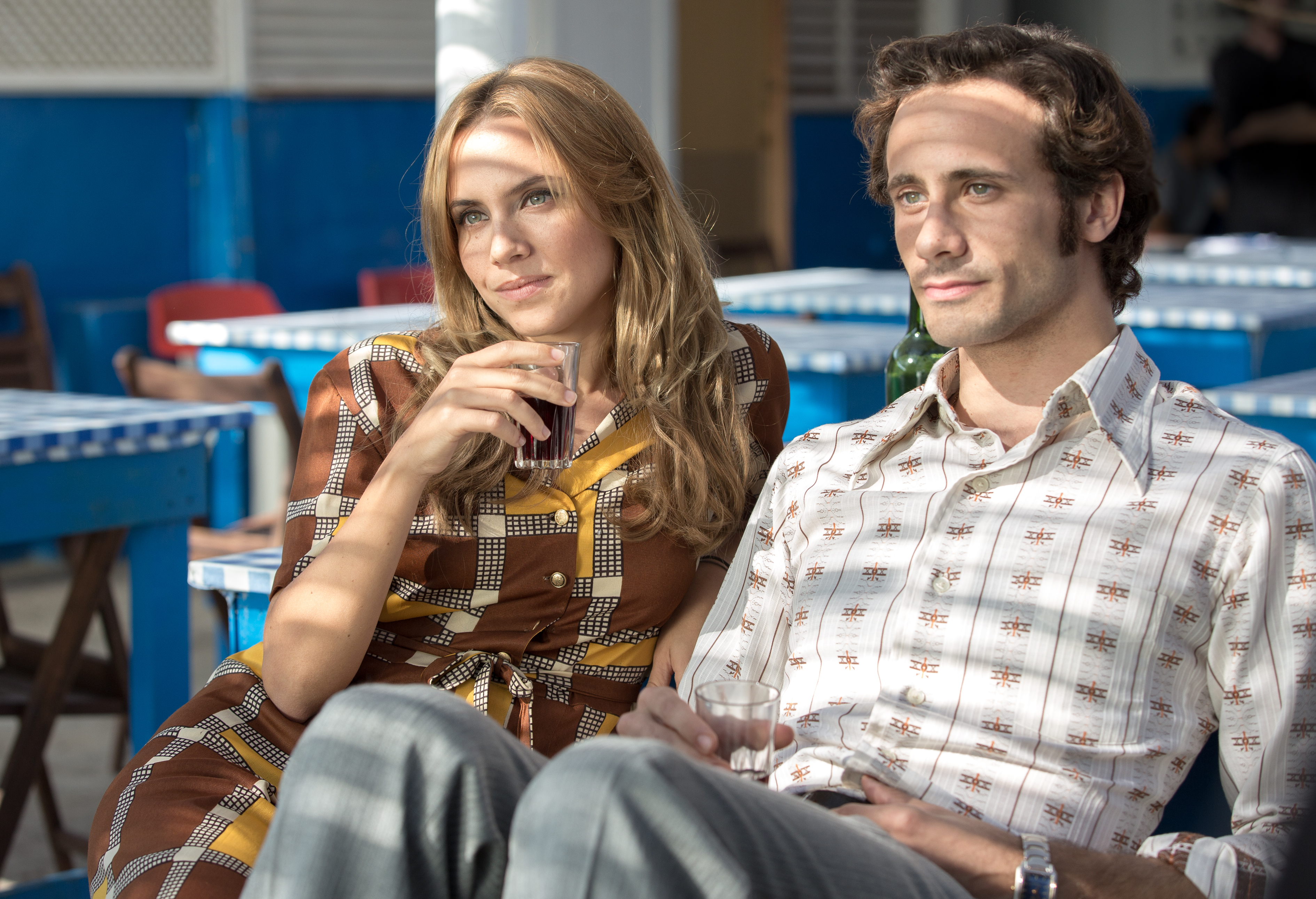Conecta Fiction: Takeaways as Spanish-Language Drama Series Build for a Streaming World
By John Hopewell
LOS ANGELES (Variety.com) – SANTIAGO DE COMPOSTELA, Spain — One enveloping industry narrative dominated last week’s 2nd Conecta Fiction, Europe’s main TV co-production meet with Latin America: the build of the two regions’ TV sectors for an ever more streaming platform-driven world. Its biggest company presentations allowed an overview of how companies still have one foot in their core business, another in the future, which capitalizing on current opportunities. Multiple takeaways on that build, and touchstones of new scripted TV, from a now must-attend event for linking to Latin America:
1.NETFLIX
Netflix didn’t steal the show at , as at Annecy in animation a week earlier and at Series Mania, with Reed Hastings mingling with E.U. and French power-brokers. But in one way it didn’t need to: in the Latin American SVOD space, by mid-2017 Netflix commanded a 96% market share among global services. The U.S. streaming giant still made, however, one of the biggest of Conecta Fiction announcements, cannily timed to drop as Conecta Fiction delegates arrived at Santiago de Compostela airport : “Hache,” a first series order from Spain’s Weekend Studio, Tomas Cimadevilla and Jorge Iglesias’ one-year-old Spanish production outfit. “Hache” marks Netflix’s fifth Spanish original scripted drama. Telefonica’s Movistar +, which backed a Conecta Fiction Festival on Thursday and Friday, is releasing one Spanish original a month. Given such production levels, the Netflix- Telefonica global partnership, announced May 28, making Netflix available to Telefonica’s Movistar + subscribers in Spain and Latin America, looks even more of a win-win pact.
2.ATRESMEDIA STUDIOS SNAGS AMAZON’S FIRST SPANISH FICTION SERIES ORDER
Having talked the talk, making the first big corporate presentation at Conecta Fiction, Atresmedia Studios, the Spanish broadcaster’s TV production arm, walked the walk on Friday, revealing it had snagged an order to produce Amazon Prime Video first fiction series order in Spain: “Little Coincidences,” teaming for production with Spain’s MedioLimon and Onza Ent. A romantic comedy between two commitment-averse potential long-term partners, “Little Coincidences” follows on “El Embarcadero,” commissioned by Movistar+ and co-produced with “La Casa de Papel’s” Vancouver Media. Producing contents for third-party national and international operators, initially targeting Spanish-speaking markets, Latin America as well as Spain, Atresmedia Studios marks a milestone in the broadcaster’s transformation from a broadcaster-content distributor into a content creator, capitalizing on strong tailwinds: “Velvet,” “Vis a Vis,” “La casa de papel” (Money Heist), three emblematic series which broadened the global reach of Spanish scripted shows, and lay nearer to streaming platform sensibilities than most free-to-air productions, Atresmedia fiction director Sonia Martínez noted at presentation. Producing for third parties, Atresmedia can bring to the table the “best fiction team capable of bringing great content onto mass markets,” Atresmedia CEO Ignacio Corrales said at the presentation. Doing so, it caters for skyrocketing demand in the pay TV and streaming rather than free TV space.
3.LATINO PEAK TV?
YOU’VE GOT TO BE JOKING
U.S. basic cable fiction production has peaked, broadcast production has plateaued. France’s overall fiction production is up over 2014-17, as is the U.K.’s, from 64 in 2014 to 77 series last year.
But of Europe’s “big five” markets, only Germany displays the huge ramp up in drama series production – understanding drama in contrast to comedies, dramedies, sitcoms and mini-series – now seen in Spain and Latin America, Luis de Zubiaurre Wagner, at Spain-based TV analysis company Geca, pointed out in Santiago in an opening statistical overview, “Fiction’s Golden Age: A Model in Transformation.”
Spain produced six dramas in 2014, 14 in 2017. That figure should rise all the more this year as Movistar + kicks in its first full annual slate of one fiction series a month (a minority being comedies). Mexico produced one drama in 2014, 13 in 2017; Argentine production rose from 5 to 12, according to Teleformat/Geca figures. No figures for Brazil are available: But given Globo’s drive into shorter-format production of around 8-13 episodes, overall drama production in Brazil will be notably up as well. Globo used to produce around four-to-six series a year of 26-42 episodes. From 2014, with the entry of Carlos Henrique Schroder, Globo produces 12-16, Globo’s Gustavo Gontijo commented at Berlin. Some, such as ER drama “Under Pressure,” have scored stellar ratings. Gontijo added that Globo had 28 projects ready to be produced.
4.LATINO PRODUCTION DRIVERS
One, very obviously, is SVOD. Latin America offers large growth possibilities for OTTs, Zubiaurre Wagner observed. Hobbled by scarce broadband, the region had only 18.2 million SVOD subscribers in 2017, he added, citing figures from Dataxis. But subscriber levels grew 29.8% just last year. That OTT market, favored by younger audiences, still has to be taken.
Given increased demand from digital platforms – Netflix, Amazon, HBO, Apple, Movistar + – Atresmedia Studios’ potential clients will be looking to produce 50% more drama series in 2019 that this year, Ignacio Corrales commented at Conecta Fiction. This production hike is seen across the TV board, however. Turner Latin America aims to produce 15 original series by 2021, up from five-to-six in 2017, Turner Latin America’s Marcelo Tamburri confirmed in Santiago. Fox Networks Group Latin America’s Mariana Perez noted at a Conecta Fiction company lineup presentation that it has 10 series in production for 2018, more than last year. Fox needs ever more content, scripted and non-scripted, above all for its Fox Premium service, Pérez explained. Three of the four companies at one of Conecta Fiction’s biggest panels, “Creator, Producer, Distributor, TV Channel….What Else?” – Miami-based Telemundo International Studios, Israel’s Keshet, which has launched offices in Mexico, and Brazil’s Globo – are all ramping up short-run premium series.
5.TURNER LATIN AMERICA: THE BALANCING ACT
Turner Latin America’s essential evolution is “from a company dedicated to producing TV channels to a company producing content, controlling our IPs,” Turner Latin America’s Marcdelo Tamburri said at Conecta Fiction. “Obviously we’re not neglecting our core Latin American pay TV business, which remains highly healthy,” he added. “We have one foot in what we’re doing, and doing well, and one foot in the future.” Figures back up this mixed strategy. In Europe, a more mature SVOD market, SVOD subscribers make up 20% of total pay TV clients but only 6.8% of pay TV revenues, given significantly lower rates, Zubiaurre Wagner observed, citing figures from the European Audiovisual Observatory and Ampere Analysis.
6.’EL RECLUSO’: TELEMUNDO INTL. STUDIOS SHOWS ITS HAND
One big world premiere for Conecta Fiction: the first full episode of “El Recluso” (The Inmate), Telemundo International Studios’ first drama production, which was given pride of place at Conecta Fiction, screening at its Tuesday night prize gala. Starring Argentina’s Ignacio Serricchio (“Bones,” “The Young and the Restless”) as a former Marine who infiltrates a maximum security prison on the U.S.-Mexico border to retrieve the abducted daughter of an American judge, the series mixes more straight-arrow testosterone action and some of the near surreal social realism of its Argentine original “El marginal.” First fruit of TIS’ push to make shorter format premium series, of 10-15 episodes, enrolling top Hispanic and Hollywood talent – “El Recluso’s” cinematographer is Jaime Reynoso, production designer the Oscar-winning Brigitte Broch – “El Recluso” targets very clearly international markets and streaming platforms. The biggest question may be where it will fit on the schedule of Telemundo itself, which bows the series later this summer.
7. CONECTA FICTION GROWS
Backed by the forward-looking government of Galicia, north-west Spain, as it drives to diversify its economy, growing its cultural industries, the 2nd Conecta Fiction confirmed the forum’s status as Europe’s key meet for co-production and networking with Latin America. Powered by a larger presence of delegates from France and Germany, the layer of which received a country focus, attendance powered up 33% from 400 to 531. But it is the caliber, not the quantity, of participants which distinguishes the event. “The people are here who should be here: the decision makers,” said Pol-ka’s Manuel Martí. Running June 18-22, taking in a final Conecta Fiction Festival showcasing Movistar + series, the 2nd Conecta Fiction took place at a challenging time for content industries. “Attending, companies can exchange best practice analysis on what’s working in their countries, consumer habits, strategies,” Conecta Fiction director Geraldine Gonard commented in her concluding remarks. Some common consensus on practices is in fact remarkably clear.
8.GALICIA: GROWING
From at least “Mareas Vivas” (2000-01) and “As leis de Celavella ” (2003-05), the latter’s writers including “Fariña” creators Ramon Campos, Carlos Sedes and Gema R. Niera and “Hierro” creators Pepe Coira and Alfonso Blanco, Galicia, driven by the zeal for fiction production of pubcaster TVG, has grown a reputation for scripted drama. Its output continues to grow. “Hierro” was the subject of one panel. Its Galicia-based producer Portocabo also announced a new co-production: Kids’ live action adventure “Miracle Tunes,” adapting the hit Japanese series format, co-produced with Italy’s ShowLab, Blasteem, Mediaset and Giochi Preziosi and Switzerland’s Kamca Group. CTV, the 33-year-old Galician production house, announced its biggest international co-production to date, domestic abuse thriller “O Sabor das Margaridas,” produced with regional public network TVG and Mexico’s Comarex. Agadic’s Jacobo Sutil meanwhile outlined at Conecta Fiction a new Galician government funding line of €1.0 million ($1.16 million) for a movie or €1.5 million ($1.75 million) for a series related to the St. James Way.
9. DIVERSIFICATION: FOX NETWORKS GROUP’S ‘THE HOST’
One of the most surprising Conecta Fiction sneak-peaks was Fox Networks Group Latin America’s “The Host,” also produced by Pol-ka, a hybrid fiction comedy come musical, toplining Adrian Suar, a blockbuster comedy star (“Me casé con un boludo”) and head of fiction programing at Argentina’s Artear, as a lovelorn hotel manager who invites famous singers to perform, while improvising comedy with other Argentine comedians. Scheduled to air across Latin America from September, it shows Fox beginning to develop a more general entertainment range which will aid its bid to become appointment viewing in an ever more digital space.
10.THE BUSINESS
Not primarily a sales market, Conecta Fiction does serve, however, for companies to announce deals. Madrid-based Imagina Intl. Sales (IIS), conglom Mediapro’s distribution arm, confirmed the sale of “Lifeline” to Mexico’s TV Azteca and the Middle East’s MBC, a first Spanish series buy for the Arab free-to-air channel. Meanwhile, DirecTV acquired Latin American pay TV rights to Mediaset España hit “El Accidente,” sold by Eccho Rights.
11.THE OTHER REVOLUTION: MOVISTAR +, CHARACTER AND ‘EL DIA DE MAÑANA’
“At the beginning of the OTT revolution, large emphasis was placed on every episode having a cliff-hanger ending. Drama was prioritized over character. But now, in the latest wave of drama series, character is prioritized: Viewers are so interested in the characters that they want to know more about them,” Pol-ka’s Manuel Martí commented at Conecta Fiction.
Dramas embody characters’ journeys. The biggest theatrical world premiere at Conecta Fiction Fest, the first two episodes of Mariano Barroso’s “El Día de Mañana,” is a large case in point. Produced by Movistar + and Mod Producciones, headed by Fernando Bovaira whose producer credits include Alejandro Amenábar’s “The Others” and Oscar winner, “The Sea Inside” and Alejandro G. Iñarritu’s “Biutiful,” “El día de mañana” adapts the same-titled novel by Ignacio Martínez de Pisón. Set in Barcelona from the 1960s to mid-70s transition to democracy, the novel offers a kaleidoscope of first-person accounts of their relationship with the figure of Justo Gil, which never gets to speak in the book. Barroso, in contrast, uses the length of a six-part limited series to peel away the often contradictory layers of Gil’s personality: Devout son and lover, con-man, Francoist secret police snitch, maybe political martyr, an orphan searching for his identity, capable of sending men to torture in police cells in order to survive. As the pockets of resistance to Franco’s arcane regime broaden by the mid 70s, his fated love story with a printer’s assistant turned left-wing actress Carme Román, makes for compulsive viewing.
12. MOVISTAR + : ‘HIERRO’
A slice of stylish, remote Canary Island noir and pioneering international co-production between prestige French players Arte France (“Riders on the Storm”) and Lagardere flagship production house Atlantique Productions (“Midnight Sun”), plus Galicia’s go-ahead Portocabo, “Hierro” marks the first international co-production of Movistar +, the pay TV arm of Spain’s Telefonica, which has driven into original series production more than any other telecom in Europe but normally retains 100% of IP. That co-production rose “organically” given “Hierro’s” subject, Movistar +’s Ismael Calleja said at an update panel on “Hierro.” “It’s possible to make international co-productions, although content may seem very local, because of the interest content can spark in specific international players, which give the project a larger relevance from its start,” Calleja added.
But what is “Hierro” really about? Again, character. In it, a woman judge (Candela Peña), just arrived on the isle, investigates a potential murder. Prime suspect is a local landowner (Dario Grandinetti), whose daughter was about to marry the victim. “‘Hierro’ is very serialized. But it’s more a character-driven show, about two strangers who come to Hierro and for very different reasons come into conflict with the community,” said Atlantique’s Olivier Bibas. He added: “We are very happy to see that characters are above plot. In France, most writers are still very much plot-driven, not enough character-driven.”
13.GAME ON: THE BATTLE FOR TALENT
On June 19, Conecta Fiction’s first full day of meetings, Netflix moved waves, announcing an exclusive multiple-year overall deal with German series “Dark” creators Jantje Friese and Baran bo Odar. The pact follows overall deals in the U.S. with Shonda Rhimes, Ryan Murphy and Jenji Kohan. European auteurs sometimes fight shy of committing to just one company. But the battle for talent, especially writing talent, looks surely on. Atresmedia Studios’ Corrales said he did not rule out cutting exclusive deals with talent. Weekend Studio styles itself as a conduit to transform screenwriters into show runners for streaming platform series.
14.CO-PRODUCTION: SHARING THE RISK
“What sets Conecta Fiction apart is that it’s a co-production, not sales market, which is a sign of the times,” said Martí. The same basic reasons for the surge in co-production apply as over the last few years. Raising co-finance is but half the story. Globo is co-producing with Brazil’s biggest independent production companies – o2 Filmes, Gullane – and big broadcasters such as Telemundo. Shorter format series can travel well in Europe, Globo’s Junior Volpato argued at a Conecta Fiction panel, citing sales to Walter Presents, the U.K. Channel 4’s VOD service, of Globo’s “Merciless” and “The Hunter.”
“Co-production is a way to share risk and create premium series,” added Telemundo Intl. Studios’ Ana Paula Valdivinos.
Fellow panelist Kelly Wright, at Israel’s Keshet, agreed. Based in a small country with just six million Hebrew speakers, co-production, including co-investment in English-language series, is one way for Keshet to achieve international standard content, she said. But co-production also helps companies share risk, when risk-taking can pay off so well, she argued. She cited the case of “When Heroes Fly,” show-run by Omri Givon, co-creator of “Hostages,” on which Keshet tried and failed to find a Latin American co-producer. It went on to win Canneseries Best Series, snag an English-language adaptation from Keshet International’s L.A.-based Keshet Studios, and beat out “Big Brother” as Israel’s top rating show. “A lot of people use co-production to get projects cheaper. That’s not the point,” Wright said. “The point of co-production is to take a risk on something which might propel your business, producer or broadcasters, ahead of the competition.”
15. LANGUAGE, SALES, STILL AND UPHILL BATTLE
“I’ve heard a lot of talk about language being irrelevant,” Wright also said at the Conecta Fiction panel. “I think it’s still relevant. People are still very scared of foreign languages and minority languages,” she added, citing Keshet’s “When Heroes Fly.” “And I want to put that out there. In the end, we believed so much in this project that we financed it ourselves.”
16.AUTHENTICITY: ‘SKAM’ REMAKES IN EUROPE
Another touchstone in the new TV age: Authenticity. Its importance was brought up time and again by Conecta Fiction panelists. Arte France’s idea in boarding “Hierro” at a very early stage, for instance, was “to come on board a prime project and keep it as it is, not to make it more French or German, [but rather be] a warden of the authenticity or integrity of the project,” said Arte France’s Alexandre Piel.
Another panel instanced the differences in the French, German, Italian and upcoming Spanish version of “Skam” (Shame), the break-out Norwegian short format series. All the adaptations turn on the conflicts, problems and preoccupations of adolescents,” said Movistar +’s Ismael Calleja, producer of the Spanish retread. But there are notable differences in detail, such as, at least in the trailers, the music: Throbbing techno beat in the French version, more laid back electronic hip hop for “Druck,” Germany’s version; Italian pop anthems for “Skam Italia.” The Spanish version was researched for months, stars non-pro actors whose own lives feed into their characters, Movistar +’s Fran Araújo said at the “Skam” panel.
17.CREATIVITY: HBO, ‘SR. AVILA,’ ‘DESTINO RUSIA’
Rather than a sales market, Conecta Fiction is “far more concerned with creativity, on companies getting together to create something, which is healthy,” said Pol-ka’s Manuel Marti. “Conecta Fiction examines new business models but the bottom line is that if a series is good, even if it starts off on a small channel in Israel, it will travel the world,” he added, citing “When Heroes Fly.” Seen in the best U.S. dramas, which European creators deeply admire – Damian Lindelof was feted like a rock star at last year’s Series Mania; news that David Simon has a Spanish Civil War project set up at Mediapro moved waves at MipTV – creativity was often stage center at Conecta Fiction panels. Two examples: HBO Latin America’s “Sr. Avila” and “Destino Rusia,” its first co-production with HBO España.
HBO Latin America was the first company to launch premium, shorter-run returning series in Latin American, 15 years ago with “Epitafios,” Roberto Rios, HBO Latin America corporate VP of original production, reminded an audience at a panel, “Co-production Without Borders: HBO Latin America and HBO Europe.”
The common denominator of HBO, its brand, is its “care for narrative,” “telling stories in a different way,” Miguel Salvat, HBO Europe commissioning editor, original programming, Spain, added at the panel.
So “Patria,” written by Aitor Gabilondo, and currently in development at HBO España, comes in on the impact of ETA terrorism from “a novel point of view.” Presented in a world premiere sneak peek by Rios, “Sr. Avila’s” Season 4 trailer suggests the final part will also come in on organized crime from a different angle in a psychologically claustrophobic, violent, dark ethical odyssey as Avila fights for his life – it seems – and, as throughout the series, for what remain of his soul.
“Destino Rusia” also comes in on its subject, the 2018 FIFA soccer World Cup, from a distinctive place. HBO Latin America and HBO Europe chose to co-produce not for financial reasons but for editorial input. “It’s not your typical soccer series,” Ríos said at Conecta Fiction. Rather it homes in on the dominant narratives facing national teams – can Uruguay punch yet again above its country’s weight? or Colombian Juan Carlos Ospina triumph with his tactics as Mexico’s manager? – and players’ remarkable origins stories.
Doing so, it builds up through successive episodes a fresco of macro issues plaguing the world: Paralyzing poverty – Colombian Carlos Bacca’s family couldn’t afford his bus ticket to train; and racism – a young Paulinho quit soccer after being the butt of racist slurs when playing in eastern Europe.
In such a sorry social wash, can individuals make a difference? The series returns time and again to the mothers of players, or their first or second trainers, remembering what they did for their sons or young wards, and sometimes how their wards help them now. Telling these stories, many interviewees choke before the camera.
Strengthening its close relationship with talent, Mediaset España took an equity position last year in showrunner Aitor Gabilondo’s new production house Alea Media, whose first TV fiction fruit, drama “Vivir sin permiso,” picked up by Netflix, was the focus of a case study at Conecta Fiction.
Inspired by a book from Galicia’s Manuel Rivas,“Vivir sin permiso” follows the tribulations of a drug lord diagnosed with Alzheimer’s disease. The drama is seen by Gabilondo as a family saga, rather than a narco-style series, he said at Santiago. Here, the differentiating element is his Alzheimer condition. “Alzheimer is a collective and contemporary fear. I found it very interesting to apply it to an evil character,” Gabilondo reflected.
With Gabilondo working with HBO España to co-develop “Patria,” Mediaset España is linking ever more with big global players. On recently-announced primetime cop thriller project “Brigada Costa del Sol,” Mediaset España has joined forces with Warner Bros. Intl. TV Production España, which produces, again with the participation of Netflix. “We can perfectly link hand in hand [with SVOD players],” Arantxa Ecija, Mediaset España head of fiction, said at the Conecta Fiction presentation.
19.CARING FOR THE BRAND
“Companies results should be analyzed and valued according to their own strategy,” Miguel Salvat, HBO Europe commissioning editor, original programming, Spain, said at a panel: “Co-production Without Borders: HBO Latin America and HBO Europe.” HBO’s most important asset is its brand. “We’re producing to raise the perception of brand quality at a local level,” Salvat added. So HBO “isn’t in the volume business,” he concluded. “The greater the world’s drama series production volume, the more the chaos, the more important is the role of prescribing the brand.”
20.RTVE: CLAIMING THE SHORT FORMAT SPACE
Having scored a hit, in views and brand, with short format “Si fueras tu,” Spanish public broadcaster RTVE world premiered its newest short series offer “Limbo,” at a Conecta Fiction gala. Produced by Argentina’s Cruz del Sur Cine and Spain’s Aqui y Allí Films (“Life and Nothing More”), and directed by Argentina’s Fabian Forte, “Limbo” mixes technology – much of the action is seen via Skype screens or cell phones, a genre plot and large suspense and mystery as a former actress Skype calls a young man in Argentine in distress to say that the house he sold her is haunted. Eight seven-minute episodes, “Limbo” cleverly juggles several explanations through to an open ending.
21.PEAK TV?: SOME DANGERS AHEAD
One tonic at the 2nd Conecta Fiction was big companies’ announcement of weighty new fictions, whether Fox’s Season 2 of Gael García Bernal’s “Here on Earth” or HBO Latin America’s first Colombian fiction series, “Mil Colmillos,” from Jaime Osorio (“El Paramo”).
Beginning with a punishing battle, which traumatizes its combatants for years, the cost of “When Heroes Fly” doubled normal series, Keshet’s Kelly Wright said on a panel. As more international series get made, some sectors – Brazil’s, for example, thanks to Netflix orders – have pretty well zero unemployment as competition for audiences and sales slots intensifies. How long some companies will continue to produce drama series – rather than plump for non-scripted shows delivering, at least on free-to-air, sometimes far better ratings for much lower costs – remains a mute question. 2018’s Conecta Fiction suggested that for many companies, that just isn’t an option.
Pictured from top to bottom:
Oriol Pla and Aura Garrido “El Día de Mañana”;
Sonia Martínez, Ignacio Corrales, Ignacio Manubens, Atresmedia Studios;
“El Recluso” (The Inmate), Telemundo International Studios;
Agadic’s Jacobo Sutil and
Geraldine Gonard, director, Conecta Fiction; th
e cast of “Druck” ;
HBO Latin America’s “Sr. Avila”;
Gael García Bernal in Fox Networks Group Latin America’s “Here on Earth“
